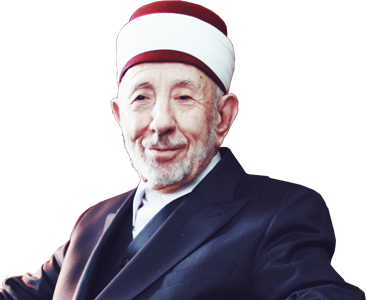
العلّامة الشهيد محمد سعيد رمضان البوطي

- Would your Eminence give me a brief notion about the stages of “Al-Tazkiya”,
“Al-Ahwal”[1] , and “ Al- Maqamat”[2] that the Muslim go through, seeking the purification of his heart and soul, followed by the previous seekers?
Dr. Muhammad Saeed Ramadan Al-Bouti answered:
In the name of Allah, the All Merciful, the Ever Merciful. All praises are due to Him, the One and Only; and all prayers and blessings of Allah be upon His Messenger Muhammad, and upon all his family and companions.
“Al- Tazkiya” (The purification of soul) is a term mentioned in the Holy Quran. It means the seeking of the purification of one’s heart and soul from every evil trait that clunks persistently to one’s soul that lead him to perils.
These evil trends distort one’s faith to make it a useless, fake one. The most dangerous of them, is arrogance. Then secondly come: self- conceit, malice, and love of the worldly life with its appearances: wealth, prestige, and power, etc.
The way of self- purification is concentrated in monotheism that becomes a deeply rooted belief, capturing the mind. In fact, monotheism is not the merely uttered sentence: “There is no god but Allah”. However, it becomes an absolute mental belief that Allah is the one in His divinity, one in His Attributes, and one in His actions. No one ever part Him. He is the Sustainer of the whole universe. Therefore, He is the Giver of life and the Giver of death; the Afflicter and the Propitious; and the Superb Bestower and the Preventer.
Nevertheless, monotheism does not become a deeply rooted faith in mind, then a captivating effect on the conscience, without the excessive feeling of “Muraqaba”[3]
(Meditation). This can be achieved only through “Dhikr” (the remembrance of Allah).
In fact, one’s tongue is only a tool in that process. The best way for the ideal remembrance is that the Muslim always relates the blessings with its Giver. Whenever a blessing overflows him, he remembers His Lord- the Bestower. He firmly believes that it comes from Him- the Exalted. Hence, it is known that there are uncountable bounties bestowed by Allah, he will always be in His remembrance. It was our prophet’s way in remembering Allah- the Almighty.
On following that way of remembrance, the doctrine of the Oneness of Allah is implanted in the worshipper’s mind. Meanwhile, the false effectiveness of change
disappears from his thought. Then this strong belief is reflected on his heart in tides of love, fear, and sublimity. Thus, he knows with his mind; and feels with his heart that the only Bestower in the whole universe is Allah; and the Ruler of His worshippers and creatures is Allah. Therefore, the blaze of these dominating feelings burns all the clung evil qualities.
The Muslim, at this moment, belittles his self- image to discover he has nothing to boast with. He only regards all things in the worldly life nothing but soldiers in the hands of its Great Creator.
As for what you have asked me about “Al-ahwal” (the mystical experiences) represented in the so called “Fana” and “Baqa”; late Sufis and the modern ones consider these experiences as stages in the path of the seeker after Allah’s please. He, the seeker, should bear in his mind to reach each stage, and pass to the next.
Nevertheless, this conception contradicts the path of “Al-salaf al-salih” (the righteous’ predecessors). Moreover, it is not the way drawn by the Grand seekers who followed the mentioned path, such as the followers of “Al-Qushairah”.
>span class="MsoSubtleEmphasis">
On their way to that aim, some seekers may be exposed to the so called “Fana” (annihilation of the self). He becomes totally separated from the universe, and only meditates in the Creator. On reaching such stage, he possibly expresses these feelings in a way far from reality and the Islamic law.
We should know that this is an incidental case; the seeker ought not to consider it as a stage he must go through or stop at. Instead, he should avoid it, as possible. In case of being helpless, he must know that he is afflicted by weakness in his faith. Whereas, the Messenger‘s companions, their followers, and the best of righteous’ predecessors were drawn away of this weakness. The seeker necessarily does his best to overcome that stage to another one called “Al- Baqa”. It is the stage where he deals with the earthly reasons according to the scales of Allah’s decree. However, he does not believe in its effectiveness by its self.
What I have mentioned about the mystical experiences, can be said about
“Al- Maqaamat” (stations) like - in hierarchy: Patience, gratitude, acceptance, and certainty. The seeker falls in great mistake to bear in his mind the necessity of passing through each station to reach finally to certainty. However, from the very beginning of his way, the seeker should exert all his effort to reach the highest of certainty. Patience, in fact, cannot be considered apart from certainty. Similarly, acceptance cannot be considered apart from patience. It is required from the person who determines to strive against his tempting self, to put before his eyes to be graced with patience, acceptance, gratitude, trust, and certainty at the same time. It is attained by the excessive remembrance of Allah. Moving the prayer beads between your thumb and forefinger is not the evidence, however, remembering the Creator whenever you see His universe; and remembering the Bestower whenever you feel His blessings – are the real remembrance.
Probably the system of some seekers obliged them to elevate gradually in these stations. Nevertheless, they are compulsory for their followers, not an educational scheme for all the seekers.
You must know, brother, what you have asked me about- whatever its name – are tender feelings and noble behaviors dominated by the Islamic law. It is not a taught science, an acted art, or a job to earn your bread from.
One of the righteous predecessors once said: “Sufism in the prime of Islam was a concept without a name. However, nowadays it becomes a name without a concept”.
- My dearest teacher, Shiekh Muhammad Saaid, May Allah stead your feet on the right path. Would you please give me a daily “Wird” (litany) to recite in order to purify myself, and another one to recite with my family? How nice it would be if it is your father’s litany, may Allah rest his soul !
- My father’s litanies that he adhered to them, and always recommended are :
- “Istighfaar” (Asking Allah’s forgiveness) before “Al- Fajr” (the Dawn prayer) –
(100 times).
- Saying “ Laa ‘ilaaha ill-allaah” (There is no deity except Allah) after the Dawn prayer-(100 times)
- Saying “Subhaan-al-Allah wa behamdeh- Subhaanal-Allah al-adhim” (Glory and Gratitude be to Allah- Glory be to Allah, the Ever- Magnificent)- (100 times)
- Saying prayers for the prophet Muhammad, all prayers and blessings of Allah be upon him. (100 times)
- Reading “Wird Al Imam Al Nawawi” (the litany said by Imam Al-Nawawi)
- Reciting Surat “Ya-Seen” and other chapters of the Holy Qur’an in the morning.
((N.B. This essay was written before the Grand Imam’s martyred, under his direct supervision. He wrote down the recommended litanies)).
[1] .It is a Sufi term which means the spiritual state. It is defined as something that descends from God into a man’s heart, without his being able to repel it when it comes, or attract it as it goes, by his own effort.(the translator)
[2] . It is also a Sufi term that references the various stages a Sufi’s soul must attain in its search for God. The most prominent distinction between ahwal and maqamat that the first are essentially gifts from God, while the other are acquired through the exertion of effort.(the translator)
[3]. It implies that with meditation, a person watches over his spiritual heart and acquires knowledge about it, its surroundings, and it creator.(the translator)